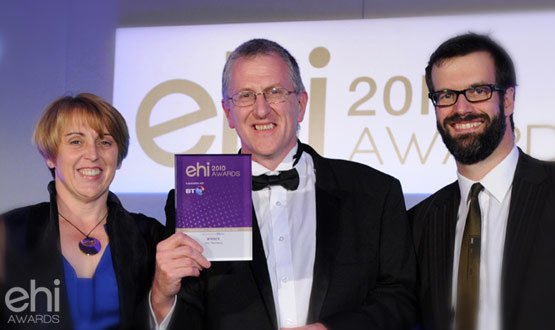EHI Awards 2010: Shire force
- 20 October 2010

John Thornbury, ICT director for Worcester Health Economy, found he had some basic problems to resolve at its five acute hospitals when he took up the post six years ago.
Fortunately, he says, he was given a “free reign” to address them. “I was brought in by the five organisations, and since the beginning they have put great trust in me to deal with problems such as disparate networks and problematic infrastructure.
“My role since the very beginning has really been about consolidating the IT and making changes to that the trusts can move forward in a number of directions.”
Strong foundations
That consolidation was put to the test last winter, when England was hit by the ‘big freeze’. Worcestershire was battered by particularly heavy storms, with up to seven inches of snow falling in one night.
“During the snow, giving staff the flexibility to work at home and view information remotely was crucial. It helped us to provide business almost as usual,” Thornbury says.
“Home working provided significant benefit to key workers, who could carry on with their duties, leaving the roads free for critical workers to go to sites.”
The shared service was able to provide this level of remote access thanks to a contract it had recently signed with BT, encompassing telephony, a local area network and wide area network services.
Worcestershire chose BT as its main supplier because it offered a single port of call if it had any problems to report, so driving costs down.
The contract has enabled the creation of an IP-based WAN infrastructure that extends to more than 300 sites and has led to the introduction of IP telephony and unified communications and collaboration.
Paul Mason, account director at BT Global Services told EHI: “John developed a UCC offering for the health community which brings together forms of communication including voicemail, email and video.
“It allows professionals to share information over these traditional forms of alongside video and web conferencing. [The project is] in the early stages of realising benefits, but finance directors have already been able to significantly reduce budgets related to travel expenses.”
Awash with IT
Thornbury has since been able to turn his attention to other projects, such as implementing a wireless network that provides extensive coverage across the organisation through 1,500 access points.
“Because we’re a rural community, we always need to be thinking about how we can provide the right information in the right place at the right time,” he says.
“But as we go along, it’s also about opening up as many opportunities as possible. So we put BT Openzone over [the wireless network] so that patients can access the internet as well as staff.”
The network also provides the foundation for a big project to implement radio frequency identification tracking of assets over the next few months.
Meanwhile, Worcestershire Health Economy is looking to digitise patient records. Over the past 18 months, it has started to put more than 1.2m medical records online, after awarding a £12.8m contract to Xerox for the work.
Staff will be able to view the records through a portal, which is being developed to provide a single unified view of a patient’s record and to share it across different departments.
“I think that it’s safe to say that my biggest achievement here is the platform that we have,” Thornbury says. “If you can get the foundations right, then you can build a skyscraper. If you don’t, it may work for a while but then it will eventually topple over.”
In for the long haul
This summer, Thornbury was nominated for EHI’s healthcare IT champion of the year award, in a strong field that was so large voting had to be split into two rounds.
He came out top of the reader poll and was presented with his award at the E-Health Insider Awards 2010 in association with BT earlier this month.
While Thornbury may point to Worcestershire’s IT platform as his biggest achievement, his 100-strong team seems to have voted for him for other reasons: specifically his ability to focus on implementing a wide variety of projects.
Thornbury attributes this ability to having been involved in healthcare IT since its earliest days. He started his career in microbiology and pharmaceutical research, and then moved into computers through the development of pathology systems.
“IT was in its infancy in the early 1990s. I’ve watched it expand significantly across so many areas to the point where it is now business critical in the NHS,” he says.
“I think a lot of trusts focus too much on one area or project. We try to look at clinical support, business support, empowering staff to support patient care – and how IT can be used in all of those areas.
“I think maybe one reason people voted for me is that there is always encouragement from my side to get people to innovate as well; to listen to every idea, as some of the best ideas come from the bottom.
“Getting everybody involved in a variety of projects keeps them interested in what they are doing, and gives them a sense of achievement every time a project is completed or gets results.
“What is important that you don’t just implement IT for IT’s sake. There always has to be a clinical and business need. Our clinical portal has become our long term strategy, which fits more with interoperability rather than with rip and replace.”
Heading in the right direction
The public sector is in for hard financial times, and Worcestershire will not be immune to them. Heatlhcare IT will need to step up to the mark and show how it can help.
When news of Thornbury’s win was announced in the local paper, the Worcester News, one commenter said: “David Cameron needs to snatch this guy up now to oversee the IT in the whole NHS, will save loads of taxpayers cash.”
Thornbury is probably too modest to agree with that. However, he says: “I know my job is going to be very much about facing up to the economic challenge, improving back office efficiencies, making more information more available, and pushing small projects driven by clinical requirements.
“It’s a great honour to win healthcare IT champion and reflect the hard work of the team. It just reaffirms that we’re heading in the right direction during what could be a bumpy ride.”




